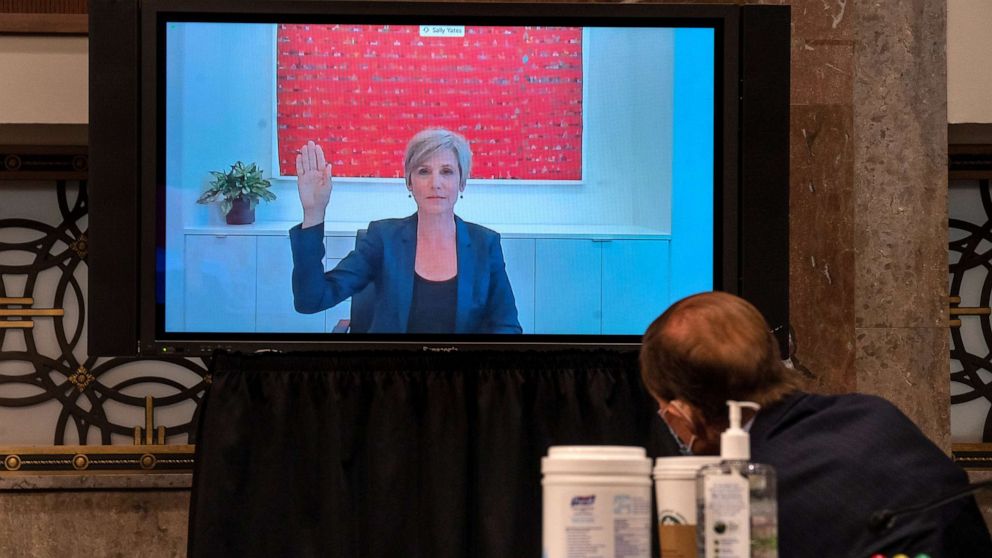Former deputy AG Yates pushes back on Republican criticism of Russia investigation origins
Former Deputy Attorney General Sally Yates appeared before a Senate panel Wednesday where she pushed back against attacks by Republicans aimed at undercutting the legitimacy of the investigation into Russian interference in the 2016 election.
Yates, who served as deputy attorney general in the final year of the Obama administration and then briefly as acting attorney general under President Trump until her firing in January 2017, defended her role in overseeing aspects of the probe and at times directly disputed claims by Republicans who have alleged President Donald Trump and his associates were unfairly targeted by the FBI.
Countering a key claim by Trump, Yates told the committee that she did not believe former President Barack Obama or former Vice President Joe Biden sought to influence the FBI's investigation into former national security adviser Michael Flynn, recalling a Jan. 5, 2017 Oval Office meeting where she first learned from Obama about Flynn's contacts with the former Russian ambassador.
"Something like that would have set off alarms for me and it would have stuck out both at the time and in my memory. No such thing happened," Yates said. "The president was focused entirely on the national security implications of sharing sensitive intelligence information with Gen. Flynn during the transition, a process at was already underway at the White House."
Early in the hearing, Trump took to Twitter to attack Yates as having "zero credibility" and being "a part of the greatest political crime of the Century."
Senate Judiciary Chairman Lindsey Graham, by contrast, said in his opening remarks at the hearing that he believed Yates acted properly and "exercised good legal judgment" in January 2017 when the FBI was investigating Flynn's contacts with Russian ambassador Sergey Kislyak.
"My view of Ms. Yates is that she exercised good legal judgment in January 2017 and if people had followed her advice, things might be different today," Graham said. "I want to let you know, Ms. Yates, from my point of view, you analyzed the situation fairly correctly and we will get into that later on."
Graham's statement was in reference to Yates' criticism of former FBI Director James Comey, who Yates agreed "went rogue" when he authorized two FBI investigators to visit the White House to interview Flynn.
Yates has said she believed the proper course was to instead inform the White House first about Flynn's false public statements regarding his conversations with Kislyak, which she said posed a potential counterintelligence threat that could make him vulnerable to Russian blackmail.
Yates sought to correct Graham several times as he stated that the basis for the investigation of Flynn was rooted in the Logan Act -- an antiquated law barring U.S. citizens from unauthorized negotiations with foreign governments.
"It was a counterintelligence threat, not a criminal prosecution of the Logan Act that was the focus," Yates said.
Additionally, Yates disputed Graham's repeated claims that the FBI had closed its investigation into Flynn on Jan. 4, prior to their interviews with him -- as well as his claim that Flynn was being investigated over a mere "policy difference" with the Obama Administration's sanctions targeting Russia's election meddling.
"The concern was not about the policy difference here, senator. The concern was about him undercutting the Obama Administration and then covering it up," Yates said.
Earlier this year, Attorney General William Barr moved to drop the DOJ's criminal case against Flynn for lying to the FBI in his interview at the White House, a decision which Yates described as "highly irregular."
"I was a prosecutor in the Department of Justice for almost 30 years, and I've certainly never seen a pleading like this," Yates said.
Yates was also questioned about her sign-off on two FISA applications authorizing surveillance of former Trump campaign aide Carter Page in October 2016 and January 2017.
A report last year from DOJ Inspector General Michael Horowitz detailed a troubling series of omissions and errors in the applications, which Yates said she was unaware of at the time she approved it.
Asked by Graham about whether she would have signed off on the applications knowing what she knows now, Yates answered she "would not sign anything I knew to include errors or omissions."




